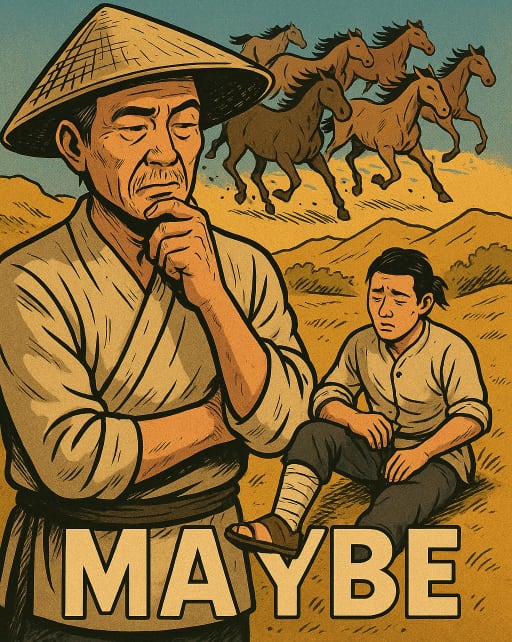Weekly Wisdom: Maybe. The Story of a Chinese Farmer (Alan Watts)

Recently I stumbled upon a short story told by Alan Watts, which got me thinking:
The Story of a Chinese Farmer
Once upon a time, there was a Chinese farmer who lost a horse. It ran away.
All his neighbors came around in the evening and said, “That’s too bad.”
The farmer said, “Maybe.”
The next day, the horse came back and brought seven wild horses with it, and all the neighbors came around and said, “Oh, that’s great, isn’t it?”
And he said, “Maybe.”
The next day, his son was attempting to tame one of these horses, and while riding it, he was thrown and broke his leg. All the neighbors came round in the evening and said, “Oh, that’s too bad.”
And the farmer said, “Maybe.”
The next day, the conscription officers came around looking for people for the army, and they rejected his son because he had a broken leg.
And all the neighbors came around in the evening and said, “Isn’t that wonderful!”
Again, he said, “Maybe.”

The whole process of nature is an integrated process of immense complexity, and it’s really impossible to tell whether anything that happens in it is good or bad — because you never know what will be the consequence of the misfortune; or, you never know what will be the consequences of good fortune.
Often, we label our experience as “bad” if we hate it. And “good” if we like it. But the bad cannot exist without the good, and vice versa. Whatever happens in our life, we’ll never know the consequences it may bring in the future.
The story of the Chinese farmer shows us (oh well, at least me) that meaning isn’t found in any single moment — it unfolds over time. What looks like a disaster might be the doorway to a breakthrough. What seems like a win might carry hidden baggage. Resilience is what helps us ride those waves (or horses) without getting emotionally shipwrecked.
Why resilience matters in our modern world
- Constant Change: Tech, jobs, and even social norms are shifting faster than a TikTok trend.
- Information Overload: We’re bombarded with bad news, comparisons, and endless notifications — all of which drain emotional batteries.
- Uncertainty Fatigue: Plans fall through, layoffs happen, health issues hit hard all of a sudden…
- you can go on and on here
We need resilience not just to “cope,” but to adapt and grow. It’s our internal shock absorber that helps us move forward when life slams on the brakes.
How to train your resilience muscle
- Reframe like the Farmer: When something “bad” happens, pause and say, “Maybe.” Give life space to surprise you.
- Journal the Journey: Reflect on past challenges and how you handled them. You’ll see: you’re tougher than you think.
- Micro-recovery moments: Breathe. Walk. Laugh. Repeat. Resilience is built in the pauses, not the hustle.
- Build your tribe: Surround yourself with “bounce-back people” who lift you without the toxic positivity.
- Get comfortable with discomfort: Take cold showers, try improv, speak up when it’s hard — train your brain to stay calm when your ego’s freaking out.
Bottom line? Life will get (or even is) weird. But with a bit of inner stretch, you’ll bend without breaking. Resilience doesn’t mean not falling — it means falling to bounce back.



